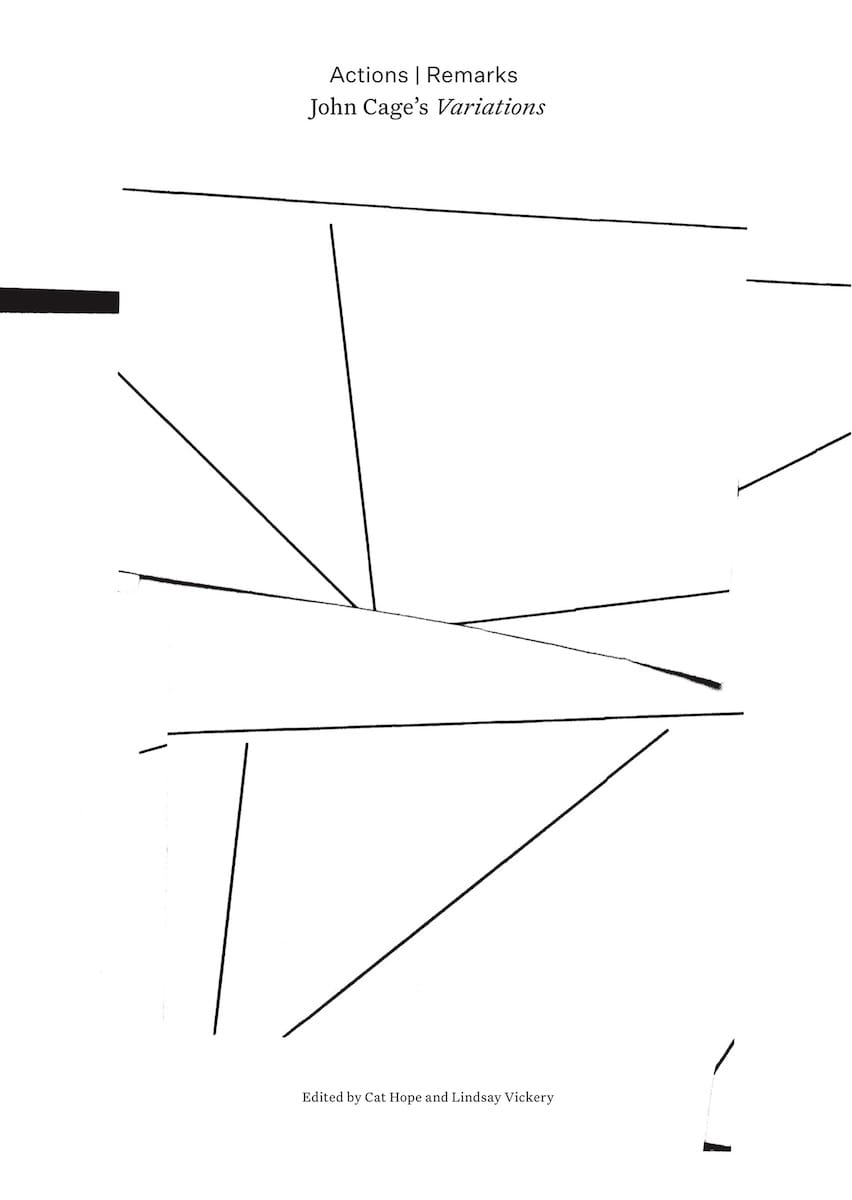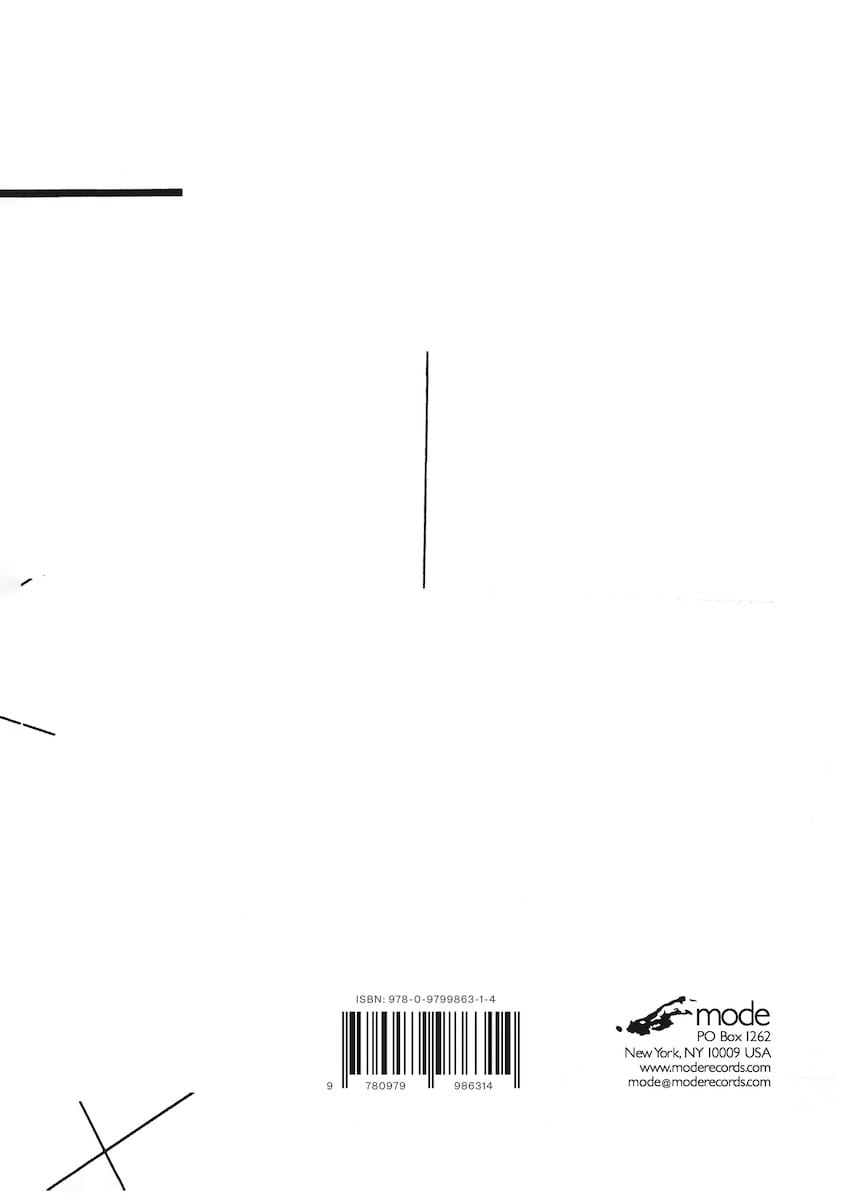Actions | Remarks
Edited by Cat Hope and Lindsay Vickery
John Cage’s Variations and the expansion of the score, sonic materials, space, and the environment.
Book edited by Cat Hope and Lindsay Vickery, including CD recording of the 8 John Cage ‘Variations’ (1958–76), recorded by the Australian ensemble Decibel.
Authors featured are Leta E. Miller, David P. Miller, Vincent Bonin, Paul van Emmerik, Thomas DeLio, James Pritchett, Cat Hope, Lindsay Vickery, Stuart James and an introduction by Warren Burt.
Book + CD. First edition. 251 pages. ISBN 978-7645930343
Printed in Germany
Variations I [bass clarinet, bass flute, and cello] 7:15
Variations II [alto saxophone, flute, viola, piano, and cello] 5:22
Variations III [drum set and a.m. radio] 3:17
Variations IV [cello, flute, viola, bass clarinet, and environmental sounds] 5:20
Variations V [reel to reel tapes and oscillators] 12:41
Variations VI [electric bass guitar and analog effects, electric cello, and digital effects] 4:31
Variations VII [mobile phones, tablet computers, and laptops] 12:39
Variations VIII [no input feedback bass clarinet] 11:32
The eight ‘Variations’ compositions by John Cage reflect the most productive years of his compositional life — from Variation I in 1958 to Variation VIII in 1976. They show the evolution of some of the earliest aleatoric, multimedia and spatial approaches to contemporary live music performance.
This book brings together new and existing perspectives, experiences and backgrounds to these remarkable works, explored by leading International Cage scholars and practitioners. The writings are complemented with a CD recording of Decibel’s Complete John Cage Variations Project, an hour long performance program featuring the Variations I – VIII. The works are performed using annotated digital scores created within the ensemble, automating many of the manual processes that resulting in new, accurate versions that align with Cage’s artistic aims. Traditional acoustic instruments and period electronics are featured alongside photocells, Arduino boards, online messaging services and calls, noise bass guitar, shortwave radio and custom DIY circuitry.
Rare composer notes and missing parts were sourced from the John Cage Trust, New York Public Library and Langlois Foundation. Published in conjunction with Cage’s publisher Peters Edition, the scores developed for the project are available via the Apple store.
Decibel is a new music ensemble and artistic research team that focuses on the integration of acoustic and electronic instruments in chamber music performance, founded in Western Australia in 2009. They are world-leading interpreters of graphic notations and pioneer digital score formats for composition and performance. This includes the ongoing development of their successful Decibel ScorePlayer App for iPad, enabling coordinated performance of graphic notations for musicians and composers internationally. They have released 7 albums and tour internationally regularly.
Cat Hope is an artist scholar whose research interests include animated notation, gender and music, Australian music, digital archiving, as well as music composition and performance as artistic research. She has been awarded Civitella Ranieri, Churchill and Hamburg Institute for Advanced Study Fellowships, and is co-author of ‘Digital Arts – An Introduction to New Media (Bloomsbury, 2014) and co-editor of ‘Contemporary Musical Virtuosities’ (Routledge, 2024). She is a Professor at Monash University in Melbourne, Australia.
Lindsay Vickery is a composer/performer whose music includes works for acoustic and electronic instruments in interactive-electronic, improvised or fully notated settings, ranging from solo pieces to opera and has been commissioned by numerous groups for concert, dance and theatre. He writes and presents on a range of topics, most recently on the emergence of the “screenscore”, nonlinear music and the realisation of Cage’s music. He is head of composition and music technology at the WA Academy of Performing Arts at Edith Cowan University, Perth, Australia.


